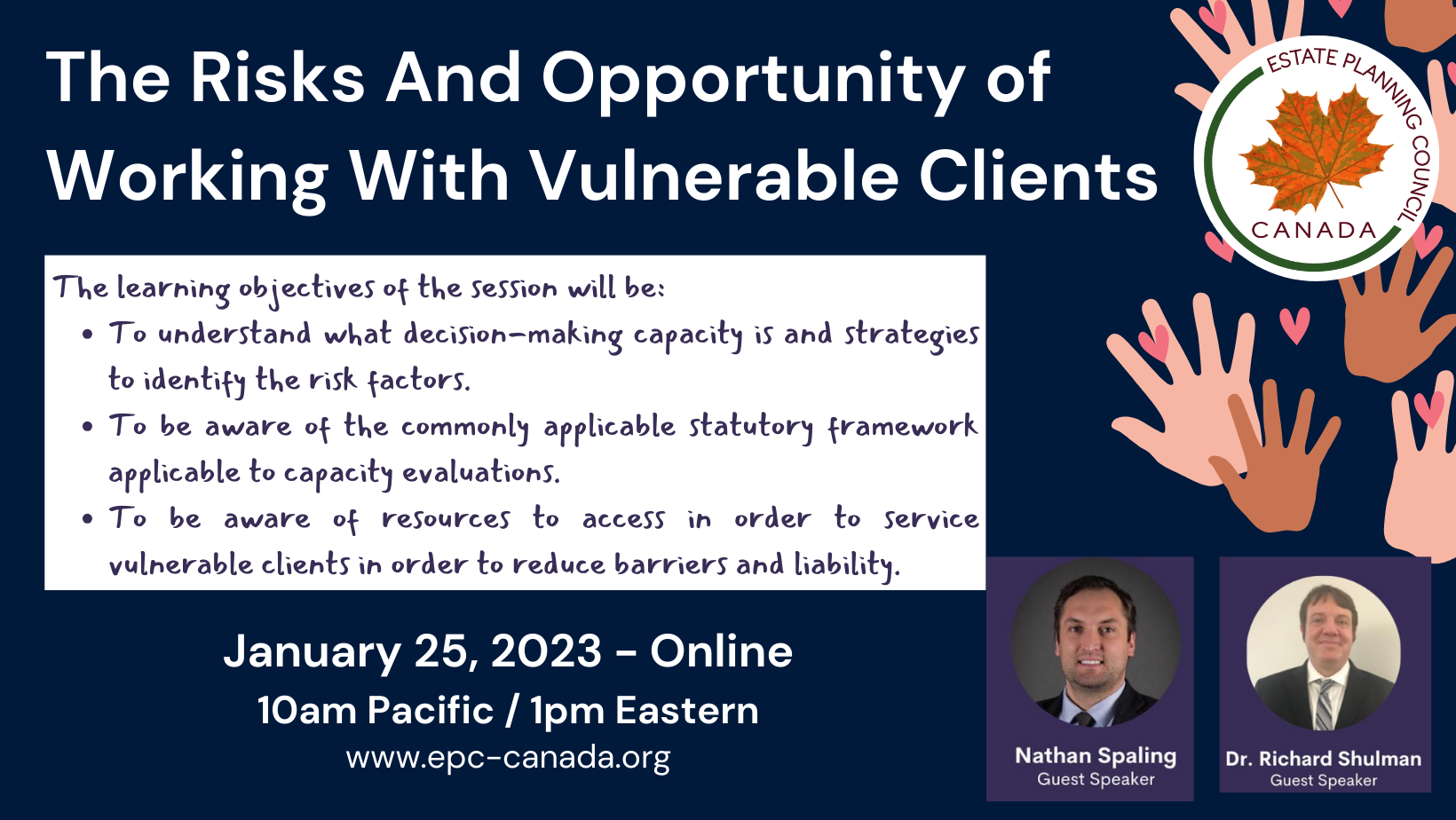We all work with vulnerable people, but some may not know it. The Canadian Mental Health Association reports that by the age of 40, 50% of the population will have or have had a mental illness. Alzheimer Society of Canada projects that by 2050 there will be over 1,700,000 people living with dementia. How do accountants, lawyers, financial advisors identify the time to step in and safeguard their clients’ interests?

This presentation will review the risks and opportunities for professionals working with vulnerable people by learning from issues and solutions developed by members of the multidisciplinary team at the Capacity Clinic.
The learning objectives of the session will be:
- To understand what decision-making capacity is and strategies to identify the risk factors.
- To be aware of the commonly applicable statutory framework applicable to capacity evaluations.
- To be aware of resources to access in order to service vulnerable clients in order to reduce barriers and liability.
Speakers:
Nathan Spaling, RSSW, BA (Hons), JD, Founder & Evaluator, capacityclinic.ca
As a Registered Social Service Worker and Lawyer, Nathan has a unique experience working with people who live with (or are living through) vulnerable conditions or situations. However, during his time as a lawyer at a well-respected law firm operating out of the Waterloo, Wellington and Halton regions, he recognized that most industries do not have access to resources/training that allow for identification, analyzing and reporting on risks of incapacity and/or undue influence.
In response to this, Nathan founded the Capacity Clinic to bring together resources from multidisciplinary leaders within the capacity evaluation area in order to reduce the barriers that vulnerable Decision Makers face when accessing services.
Dr. Richard Shulman, MDCM FRCPC, Geriatric Psychiatry
Dr. Richard Shulman trained in Medicine at McGill University (1989), and in residencies in Psychiatry (1994) and Clinical Pharmacology (1996) and fellowship in Geriatric Psychiatry (1996) all at the University of Toronto.
Dr. Shulman has been a consultant to private legal counsel as well as the Coroner’s Office of Toronto, the College of Physicians and Surgeons of Ontario, and to the Canadian Medical Protective Association in matters related to standards of care in psychiatry, psychopharmacology, and geriatric psychiatry. Dr. Shulman is an accredited expert in contemporaneous and retrospective capacity evaluations by the Ontario Superior Court of Justice including: John Gironda et al. v. Vito Gironda et al., (2013), Foley v McIntyre (2014), Chuvalo v. Chuvalo (2018) and Kates Estate (2020).
Testamentary capacity evaluation does not fall within the mandate of any regulatory authority (such as the Ontario Ministry of the Attorney General) to provide training and/or oversight on how to assess testamentary capacity or how to write a report for testamentary capacity evaluation. This is what led to the collaboration of multidisciplinary professionals at the Capacity Clinic to develop a means to improve the recognition of risks of incapacity and/or undue influence.
---
Registration $30
No charge for Estate Planning Council of Canada Members
Guests are welcome - this event is for Professional Advisors only.
Membership Information
* Forward this event link to a colleague: https://www.epc-canada.org/event-5459311